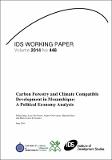Carbon Forestry and Climate Compatible Development in Mozambique: A Political Economy Analysis

Download
Date
2014-07-01Author
Quan, Julian
Otto Naess, Lars
Newsham, Andrew
Sitoe, Almeida
Corral Fernandez, Maria
Metadata
Show full item recordImpact
Abstract
This paper looks at the political economy of carbon forestry and REDD+ in Mozambique in view of goals for climate compatible development, i.e. simultaneously addressing emission reduction, adaptation and development. Mozambique is one of the world’s poorest countries and one of the most at risk from the effects of climate change. At the same time, the country has considerable forest resources and is well placed to take advantage of future public or private funding for carbon forestry and REDD+. The paper asks how debates and decisions on REDD+ in Mozambique may shape outcomes for different groups. Using a political economy framework, the paper considers actor perspectives, interests and interrelations in the broader institutional and political context in order to analyse and the prospects for carbon forestry and REDD+ to contribute climate compatible development in Mozambique.
REDD+ debates in Mozambique are coloured by international as well as domestic debates over land and forest governance, and remain somewhat divisive. Perhaps surprisingly, REDD+ is relatively marginal in the broader climate change and development debates in the country. It is as yet unclear what REDD+ will look like in practice, and most of actors’ perspectives – whether in favour or opposed to REDD+ and carbon forestry – are based on expectations of what might be, and on perceptions of the purpose of carbon forestry, rather than actual experience. The government has recently passed a decree setting out governance processes for REDD+ in Mozambique, which may open up scope for piloting and a learning process.
The possible outcomes of REDD+ projects and initiatives for climate compatible development can be considered as consequences of two key factors: first, the level of community control over land and resources, and second, the mix of natural and plantation forests and other land use activities. Across these two dimensions there is a range of possible models for REDD+/carbon forestry, all of which may be deemed ‘climate compatible’ in the sense that they could be designed to provide mitigation benefits as well as income, livelihoods and adaptation benefits. In practice, however, the outcomes for different groups and for Mozambique’s adaptive capacity and overall contributions to emissions reduction and climate stabilisation are likely to vary significantly, depending on the models adopted and the broader opportunities and constraints presented by Mozambique’s overall development context. In particular, local communities are at risk of losing out from large scale carbon plantations or exclusion from natural forests, whereas private sector REDD+ operators and conservation
agencies may be able to capture the benefits. On the other hand, while exclusionary
approaches could undermine sustainability, in more inclusive approaches, the level of
benefits available to rural community members may be very limited if alternative income
generating projects and systems for sustainable forest utilization are not established
alongside carbon payments, which in themselves are unlikely to support adequate levels of payments to participating farmers.
We conclude that a political economy analysis of REDD+ and carbon forestry options are an important complement to discussions around technical feasibility and economic affordability, and can in turn help expand the understanding of policy constraints and opportunities for REDD+/carbon forestry to support climate compatible development goals.
Is part of series
IDS Working Paper;448Rights holder
Institute of Development StudiesCollections
- IDS Research [1671]
